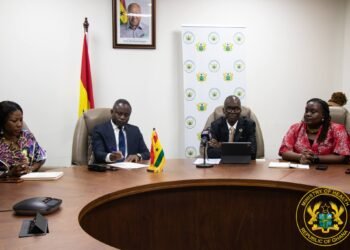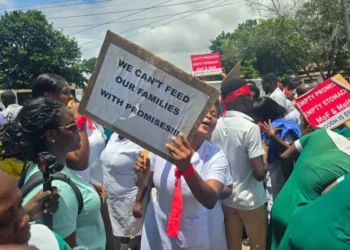An infectious disease professional, Dr. John Amoasi, has advised the government to review its COVID-19 safety protocols in light of mounting evidence showing that the virus can be spread by tiny particles suspended in the air.
Speaking in an interview today, Thursday, July 9, 2020, Dr. Amoasi, said:
“We need to immediately begin to look at revising some of our recommendations as we wait for further information.”
Also, he was of the view that he wouldn’t be surprised should the government come out with some precautions to address the airborne risk.
“I won’t be surprised if sooner, rather than later, the government will issue some precautionary measures which will address this risk [of airborne spread],” he also opined.
An open letter from over 239 scientists from 32 countries outlined evidence which shows floating virus particles can infect people who breathe them in.
They also suggested fears that the World Health Organisation (WHO) was underestimating the possibility of airborne transmission.
Since the smaller exhaled particles can linger in the air, the scientists have been urging WHO to update its safety guidelines. As a result, WHO subsequently acknowledged the emerging evidence that COVID-19 could effectively be airborne in crowded, closed or poorly ventilated settings.
But its officials have cautioned that the evidence is preliminary and requires further assessment.
This growing threat of airborne spread, in Dr. Amoasi’s view, limits the effectiveness of existing safety protocols.
“If there is consensus on the aerosolisation, it means that all these recommendations will need to change significantly. The implications are actually dire,” he stressed.
The recommendations from the Ghana Health Service (GHS), have focused on social distancing, regular washing and sanitising of hands and the wearing of face masks.
The health service has largely operated based on WHO guidelines. WHO has so far only said that the virus is transmitted through droplets when people cough or sneeze.
But the tiny particles suspended in the air which may contain the virus are produced by merely talking.
These developments come as a matter of importance to Ghana since the government has eased most restrictions that were imposed because of the pandemic.
The Electoral Commission is engaged in the voter registration exercise and final year students are in school ahead of their final exams for Basic Education Certificate Examination (BECE) and The West African Senior School Certificate Examination (WASSCE).
Currently, Ghana has a total confirmed COVID-19 case count of 22,822 of the virus with 129 deaths and 17, 564 persons discharged after treatment, leaving 5,129 active cases.
The government has noted workplaces as contributing agents to the recent surges in COVID-19 cases.
As a result of the workplace, cases, the government has outlined safety measures to guide institutions in tackling the spread of the virus at their premises.























